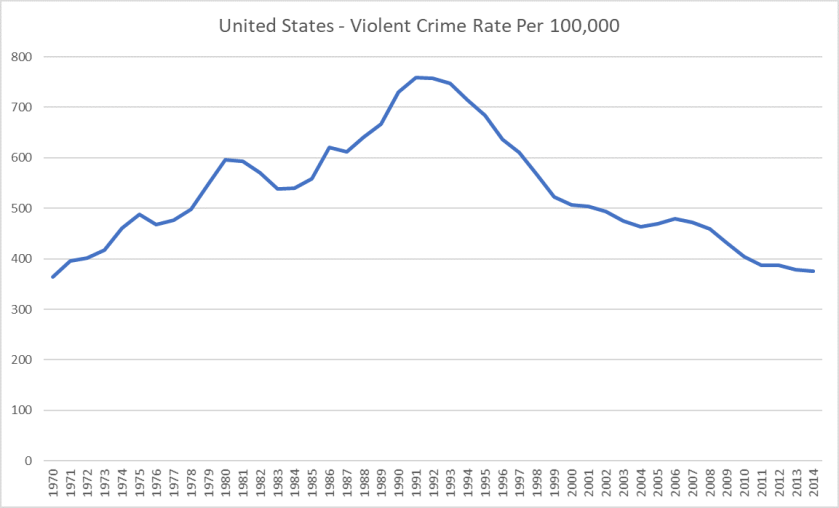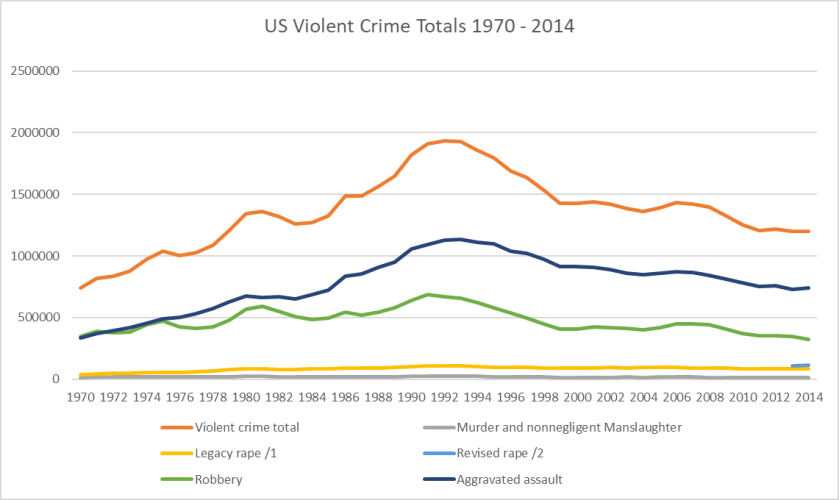
While the initial studies involving the cultivation effect primarily relied on television viewers in the study. Some have suggested that the same might be true for children and videogames. The general argument for the theory is that the more exposure that one has to a form of media, in this case videogames and the violence, misogyny, etc. within, alter the viewer’s, or player’s, perception of the outside world resulting in a “mean world”. George Gerbner contended that this would result in the perceptions of the individual to see the world as far more “mean” in nature than it might be. (Richard Campbell, Christopher, & Bettina, 2014, p. 533). In Gerbner’s studies, the subjects were television viewers. Some have argued that this could present the same kind of perception adjustments for those that play videogames, particularly violent ones. However, there are contenders to this theory and there are piles of articles that have asked the same question over and over again. Do violent videogames inspire violence in children? There is an interesting pattern that emerges as you read these side by side. The general consensus seems to be that they are no more impactful than other types of media, insofar as we have seen to date.
From Psychology Today, in an earlier study from 2004, it was found that there was “a relationship between about 5-6% of kids who get into trouble, sometimes violent, and the amount of time playing violent games.” (Beresin & Schlozman, 2012) However, it is explicitly stated that there was no casual relationship found between violent videogames and violent children, only correlations. In other words, there could be outside and unaccounted-for factors contributing to the disruptions in behavior outside of simply just the videogames. In the same article, it is noted that there were other findings within the study that Dr. Beresin and Dr. Schlozman both felt should be mentioned. First, that about 95% of the parents were not aware of the contents of the games that their kids were playing. Second, that there were no casual relationships between violent videogames and violent behavior, in this study. Third, what impact other media has had on the behavior of the children within the study. (Beresin & Schlozman, 2012) The authors go on to say that the link between violence and videogames has not been demonstrated by scientific research. Being from a psychology publication, Beresin and Schlozman bring up a couple of additional points about parentage that I believe are very good, if not better questions to be asking with regard to this dilemma.

Another article from The Telegraph cited an Oxford study that was aimed in a similar direction. Their data showed that “playing violent video games is no more likely to be damaging to young children’s behaviour than those considered harmless” (Bingham, 2015) This study concluded that it seemed as though there was no link between the violence of videogames and aggression. However, what struck me as interesting in this article was the second point that the study made. It stated that, “those who spend more than three hours a day displayed higher levels of aggression and were less academically engaged.” (Bingham, 2015) It seems that, in this dataset, it was observed that time spent performing the action of playing was more influential than what they were actually doing within the game. I admittedly have a strong personal curiosity regarding this subject and this is the first time I have seen this point made. It’s very interesting to be sure. It seems to suggest that maybe a game is really just a game after all.
With the never-ending article and questions associated with the violence of videogames, it would seem that, if there was any merit to these claims, trends in violent crimes data would support the claim that violence in videogames correlates to violence in real life. However, according to data from the FBI’s UCR database overall violent crime rates are down.

(Federal Bureau of Investigation, 2017)
In fact, the overall totals for violent crimes as dropped since peaking at around 1991 despite a rather consistent increase in population. This does not indicate that videogames are even remotely responsible for a decease in violent crime, but it does show that overall violent crime is down despite the claim that violence in videogames spurs violence in real life.

(Federal Bureau of Investigation, 2017)
But what about when you are thrust into the middle of the narrative, such as in a Virtual Reality or Augmented Reality environment? Do things change when you are one step less removed from the situation playing out in front of your television? In 2015, WIRED magazine wrote a piece about this very subject. In it, Piers Jackson of Guerilla Games, states that there was a conscious decision to not kill people in an upcoming game that they are developing for the Playstation VR system stating with regard to VR, “”It’s more intense, you can look away from it but you can’t escape it. You will feel it, like everything in VR, you will feel everything much more intensely” (Rundle, 2015). This is an interesting quote from the developer of Killzone for the PS4. A game that has a tag line of “ENTER THE MOST BRUTAL THEATER OF WAR YOU’VE EVER SEEN”. Seems to be quite the shift for this studio to make when confronted with the challenges of VR.

Aside from violence, what other things could be impacted due to videogame play, and are they the same? Due to the limited number of studies addressing these questions, and the even more prevalent question of what, if any, changes there are to this dynamic when applied to VR, my team as created a non-profit website to provide information concerning the negative themes in videogames. This challenge goes beyond the violence discussed previously. It also applies to things such as misogyny, social challenges, and aggression, which are much harder to track than violent crime. Just as with any new form of media. It is unclear exactly what impact it could have on children or even adults. Aggregating this information could provide some insights and reveal patterns that were previously invisible to better understand the impact to players and those around them. In researching this, we decided to ask game designer, Randall Mosey, about some of his opinions on these topics. Two questions stood out to me as a sticking point to creating something like this. In response to a question regarding the effects of violent videogames and their impact on people he stated,
I don’t want to comment too much on this, but I feel that it needs said that video games are powerful forms of media. Whether they be an outlet for these potential violent crimes or a catalyst to commit them is still under debate. There is evidence for both, I think.
In response to a question regarding moral obligation for portraying other countries in a more informed manner,
Absolutely. The misrepresentation or general disregard for the culture and conduct of nations other than our own can lead to this misinformation being understood as fact. Video games have a large impact on the mindset
These ideas, moral obligations, and competing views points seem to guide us in a direction of a need to clarify the impact videogames have on children. Though there is far more data concerning violence, the effect of videogames could have harsh impacts in other areas such as political views, racial views, socially acceptable behavior, and more. Understanding these impacts is imperative to ensuring that our children grow up with a healthy consumption of media and understanding of the difference between reality and fantasy. While I do not subscribe to the belief that videogames cause people to be inherently violent, I do believe that videogames, as well as other media, can be a catalyst toward violent tendencies that were already present. This in my opinion isn’t necessarily something to blame the media for, but with additional data gathered, I believe that patterns can be deciphered that could afford us the time and effort to be able to intervene and prevent an otherwise violent break.
Works Cited
Beresin, E., & Schlozman, S. (2012, December 22). Violent Video Games and Movies Causing Violent Behavior. Retrieved from Psychology Today: https://www.psychologytoday.com/blog/inside-out-outside-in/201212/violent-video-games-and-movies-causing-violent-behavior
Bingham, J. (2015, April 1). Study finds no evidence violent video games make children aggressive. Retrieved from The Telegraph: http://www.telegraph.co.uk/science/2016/03/12/study-finds-no-evidence-violent-video-games-make-children-aggres/
Federal Bureau of Investigation. (2017, December 3). Uniform Crime Reporting Statistics. Retrieved from Uniform Crime Reporting Statistics: https://ucr.fbi.gov/?came_from=https%3A//ucr.fbi.gov/word/
Hollingdale, J., & Greitemeyer, T. (2014). The effect of online violent video games on levels of aggression. PLOS ONE, 9(11). Retrieved 12 2, 2017, from https://ncbi.nlm.nih.gov/pmc/articles/pmc4229070
Richard Campbell, Christopher, M. R., & Bettina, F. (2014). Media and Culture: Mass Communication in a Digital Age. Boston: Bedford/St. Martins.
Rundle, M. (2015, October 28). Death and violence ‘too intense’ in VR, developers admit. Retrieved from Wired: http://www.wired.co.uk/article/virtual-reality-death-violence